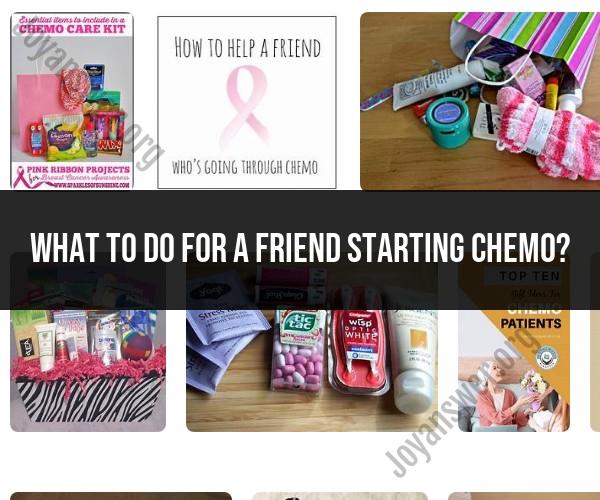What to do for a friend starting chemo?
Supporting a friend who is starting chemotherapy (chemo) can be incredibly meaningful and important during a challenging time in their life. Here are some practical tips and emotional guidance on how to support your friend through chemo:
1. Be There and Listen:
- Simply being there for your friend can provide tremendous comfort. Offer your presence and lend a compassionate ear. Let them talk about their fears, concerns, and emotions without judgment.
2. Educate Yourself:
- Take the time to learn about the specific type of cancer your friend is dealing with and the treatment they're receiving. Understanding their condition can help you provide better support.
3. Offer Practical Help:
- Offer assistance with practical tasks such as grocery shopping, cooking meals, cleaning, or running errands. Chemo can be physically draining, and these tasks can become overwhelming.
4. Accompany Them to Appointments:
- If your friend is comfortable with it, offer to accompany them to chemo appointments or doctor visits. Having someone by their side can provide emotional support and help them remember important information from the medical team.
5. Respect Their Wishes:
- Everyone's needs and preferences are different. Respect your friend's choices regarding their treatment, privacy, and how they want to share their journey with others.
6. Send Thoughtful Gestures:
- Small acts of kindness can make a big difference. Send cards, flowers, or care packages to show that you care. Consider their preferences and sensitivities when choosing gifts.
7. Offer Transportation:
- If your friend is too fatigued or not feeling well enough to drive, offer to provide transportation to and from treatment sessions.
8. Prepare for Side Effects:
- Chemotherapy often comes with side effects like nausea, fatigue, and hair loss. Be understanding and supportive when these side effects occur. Offer remedies or comfort items as needed.
9. Be Mindful of Infection Risk:
- Chemo can weaken the immune system. If you're not feeling well, avoid close contact to reduce the risk of infection. Follow any guidelines provided by your friend's healthcare team.
10. Create a Support Network:- Encourage your friend to build a support network with family, friends, and support groups. They may find comfort in connecting with others who have experienced similar challenges.
11. Respect Privacy and Boundaries:- Some people prefer privacy during their treatment and recovery. Respect their need for solitude or space when necessary.
12. Offer Emotional Support:- Be empathetic, patient, and understanding. Chemo can be emotionally taxing. Offer emotional support by being a source of comfort and encouragement.
13. Stay Connected:- Continue to reach out and stay connected with your friend, even after the initial shock of the diagnosis has passed. The support is valuable throughout the entire journey.
14. Celebrate Milestones:- Acknowledge and celebrate treatment milestones, such as completing rounds of chemo or reaching a specific recovery goal. These moments can be significant and uplifting.
15. Encourage Self-Care:- Encourage your friend to prioritize self-care. This may include gentle exercise, relaxation techniques, or pursuing hobbies they enjoy.
Remember that your friend's needs may change throughout their chemo journey, so ongoing communication is essential. Ultimately, the most important thing you can do is be a supportive, caring presence in their life and let them know that you are there for them, no matter what.
Supporting a Friend Facing Chemo: Practical Tips and Emotional Guidance
Chemotherapy is a powerful cancer treatment that can have a number of side effects, both physical and emotional. It is important to support your friend during this difficult time. Here are some practical tips and emotional guidance:
Practical tips:
- Offer to help with practical tasks. This could include things like cooking meals, running errands, or driving your friend to and from appointments.
- Be a listening ear. Your friend may need to talk about their experience and vent their emotions. Be there to listen without judgment.
- Help your friend to stay positive. Chemo can be a tough experience, but it is important to stay positive and hopeful. Encourage your friend to focus on the positive aspects of their treatment, such as the fact that they are fighting for their life.
- Respect your friend's needs. Some people may want to talk about their cancer and treatment, while others may not. Respect your friend's wishes and don't push them to talk about something they're not comfortable with.
Emotional guidance:
- Let your friend know that you are there for them. This could mean sending them a text message, giving them a call, or visiting them in person.
- Offer words of encouragement. Tell your friend that you believe in them and that you are confident that they will get through this.
- Help your friend to stay positive. Remind them of all the things they have to live for and that they are not alone in this fight.
- Be patient and understanding. Chemo can be a challenging experience, both physically and emotionally. Be patient with your friend and understand that they may have good days and bad days.
Helping a Loved One Begin Chemo: What You Can Do
The start of chemotherapy can be a daunting time for both the patient and their loved ones. Here are some things you can do to help your loved one begin chemo:
- Help them to prepare for their first treatment. This could include things like gathering their medications, packing a bag for their treatment, and talking to them about what to expect.
- Be there with them on their first day of treatment. This can be a very emotional time for your loved one, so it is important to be there for them.
- After their treatment, ask them how they are feeling and offer your support. They may be experiencing side effects such as nausea, fatigue, or hair loss. Let them know that you are there for them and that you will help them through this.
Standing by Your Friend: Assisting Them Through Chemo Treatment
Chemotherapy treatment can be a long and difficult process. It is important to stand by your friend and assist them through this time. Here are some things you can do:
- Continue to offer practical and emotional support. Help with practical tasks such as cooking meals, running errands, or driving your friend to and from appointments. Be there to listen to your friend and offer words of encouragement.
- Help your friend to stay positive. Remind them of all the things they have to live for and that they are not alone in this fight.
- Be patient and understanding. Chemo can be a challenging experience, both physically and emotionally. Be patient with your friend and understand that they may have good days and bad days.
It is also important to take care of yourself. Supporting a friend through chemotherapy can be emotionally and physically draining. Make sure to get enough rest, eat healthy foods, and exercise regularly. It is also important to talk to someone about your own feelings and experiences.










